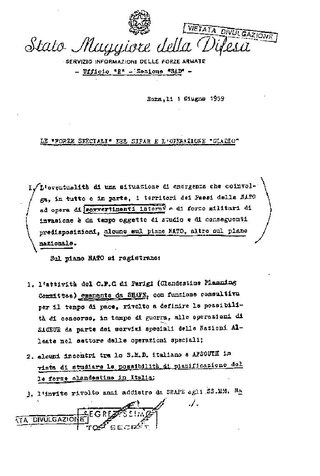Espionage, spying, or intelligence gathering is the act of obtaining secret or confidential information (intelligence). A person who commits espionage is called an espionage agent or spy. Any individual or spy ring, in the service of a government, company, criminal organization, or independent operation, can commit espionage. The practice is clandestine, as it is by definition unwelcome. In some circumstances, it may be a legal tool of law enforcement and in others, it may be illegal and punishable by law.

The Office of Strategic Services (OSS) was an intelligence agency of the United States during World War II. The OSS was formed as an agency of the Joint Chiefs of Staff (JCS) to coordinate espionage activities behind enemy lines for all branches of the United States Armed Forces. Other OSS functions included the use of propaganda, subversion, and post-war planning.

The Ministry for State Security, commonly known as the Stasi, was the state security service and secret police of East Germany from 1950 to 1990. It was one of the most repressive police organisations in the world, infiltrating almost every aspect of life in East Germany, using torture, intimidation and a vast network of informants to crush dissent.
Tactical or battlefield intelligence became vital to both sides in the field during the American Civil War. Units of spies and scouts reported directly to the commanders of armies in the field, providing details on troop movements and strengths. The distinction between spies and scouts was one that had life or death consequences: if a suspect was seized while in disguise and not in his army's uniform, he was often sentenced to be hanged. A spy named Will Talbot, a member of the 35th Battalion, Virginia Cavalry, was left behind in Gettysburg after his battalion had passed through the borough on June 26–27, 1863. He was captured, taken to Emmitsburg, Maryland, and executed on orders of Brig. Gen. John Buford.

The Directorate-General for External Security is France's foreign intelligence agency, equivalent to the British MI6 and the American CIA, established on 2 April 1982. The DGSE safeguards French national security through intelligence gathering and conducting paramilitary and counterintelligence operations abroad, as well as economic espionage. It is headquartered in the 20th arrondissement of Paris.

The National Intelligence Organization, also known by its Turkish initials MIT or MİT, or colloquially as the Organization, is an intelligence agency of the Turkish government tasked with gathering information of national interests. It gathers information for the Presidency and the Armed Forces about the current and potential threats from inside and outside against all the elements that make up Turkey's integrity, constitutional order, existence, independence, security and national power and take precautions when necessary.
A covert operation or undercover operation is a military or police operation involving a covert agent or troops acting under an assumed cover to conceal the identity of the party responsible.

The Federal Intelligence Service is the foreign intelligence agency of Germany, directly subordinate to the Chancellor's Office. The BND headquarters is located in central Berlin. The BND has 300 locations in Germany and foreign countries. In 2016, it employed around 6,500 people; 10% of them are military personnel who are formally employed by the Office for Military Sciences. The BND is the largest agency of the German Intelligence Community.

Operation Gladio was the codename for clandestine "stay-behind" operations of armed resistance that were organized by the Western Union (WU), and subsequently by NATO and by the CIA, in collaboration with several European intelligence agencies during the Cold War. Although Gladio specifically refers to the Italian branch of the NATO stay-behind organizations, Operation Gladio is used as an informal name for all of them. Stay-behind operations were prepared in many NATO member countries, and in some neutral countries.
This article covers the history of Polish Intelligence services dating back to the Polish–Lithuanian Commonwealth.
A stay-behind operation is one where a country places secret operatives or organizations in its own territory, for use in case of a later enemy occupation. The stay-behind operatives would then form the basis of a resistance movement, and act as spies from behind enemy lines. Small-scale operations may cover discrete areas, but larger stay-behind operations envisage reacting to the conquest of whole countries.
The Military Counterintelligence Service is one of the three federal intelligence agencies in Germany, and is responsible for military counterintelligence within Bundeswehr. The MAD is subordinate to the Federal Ministry of Defense.

The Central Intelligence Agency, known informally as the Agency, metonymously as Langley and historically as the Company, is a civilian foreign intelligence service of the federal government of the United States tasked with gathering, processing, and analyzing national security information from around the world, primarily through the use of human intelligence (HUMINT) and conducting covert action through its Directorate of Operations. The agency is headquartered in the George Bush Center for Intelligence in Langley, Virginia.

The Fichenaffäre or Secret files scandal shook public opinion in Switzerland in 1989. That year, it was revealed that the Swiss federal authorities, as well as the cantonal police forces, had put in place a system of mass surveillance of the population.
Projekt-26, best known as P-26, was a stay-behind army in Switzerland charged with countering a possible invasion of the country. The existence of P-26 as secret intelligence agencies dissimulated in the military intelligence agency (UNA) was revealed in November 1990 by the PUK EMD Parliamentary Commission headed by senator Carlo Schmid. The commission, whose initial aim was to investigate the alleged presence of secret files on citizens constituted in the Swiss Ministry of Defence, was created in March 1990 in the wake of the Fichenaffäre or Secret Files Scandal, during which it had been discovered that the federal police, BUPO, had maintained files on 900,000 persons.
The National Intelligence Service (NIS) was an intelligence agency of the Republic of South Africa that replaced the older Bureau of State Security (BOSS) in 1980. Associated with the Apartheid era in South Africa, it was replaced on 1 January 1995 by the South African Secret Service and the National Intelligence Agency with the passage of the Intelligence Act (1994).

The Abwehr was the German military-intelligence service for the Reichswehr and the Wehrmacht from 1920 to 1944. Although the 1919 Treaty of Versailles prohibited the Weimar Republic from establishing an intelligence organization of their own, they formed an espionage group in 1920 within the Ministry of Defence, calling it the Abwehr. The initial purpose of the Abwehr was defense against foreign espionage: an organizational role that later evolved considerably. Under General Kurt von Schleicher the individual military services' intelligence units were combined and, in 1929, centralized under Schleicher's Ministeramt within the Ministry of Defence, forming the foundation for the more commonly understood manifestation of the Abwehr.

The Swiss intelligence community is a group of agencies with responsibilities to protect the interests and infrastructure of Switzerland.

The Secret Intelligence Service (SIS), commonly known as MI6, is the foreign intelligence service of the United Kingdom, tasked mainly with the covert overseas collection and analysis of human intelligence on foreign nationals in support of its Five Eyes partners. SIS is one of the British intelligence agencies and the Chief of the Secret Intelligence Service ("C") is directly accountable to the Foreign Secretary.










